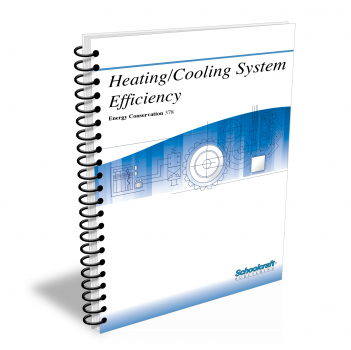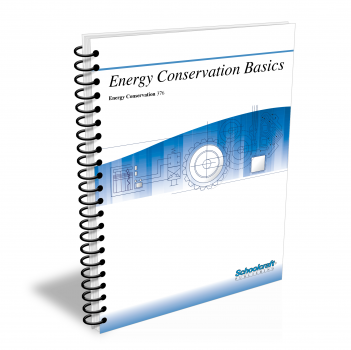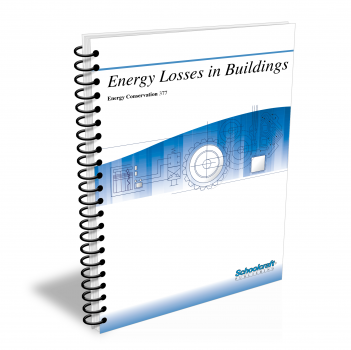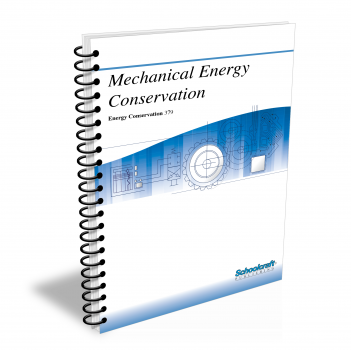Heating-Cooling System Efficiency

Course Number: 378
The Heating-Cooling System Efficiency textbook covers the measurement of various environmental factors and their effect on human comfort. It introduces the concept of zones and covers ventilation requirements and savings possible by reducing airflow. It examines energy waste vs. conservation measures relating to furnaces, boilers, air conditioners, and refrigeration equipment.
Does your curriculum require additional topics not included in this textbook? Build a customized version of the Heating-Cooling System Efficiency textbook below.
Recommended Contact Hours – 10
Preview a Chapter
Available Supporting Material
- Table of Contents
- Exam Copies
- Suggested Titles
Table of Contents
Chapter 1: Conditioning the Air
Topics: Human comfort; Heat generation in buildings; Thermal zones; Types of HVAC systems; Guidelines for HVAC
Learning Objectives:
- Explain the various environmental factors affecting human comfort.
- Interpret the ASHRAE comfort chart.
- Differentiate between sensible and latent heat.
- Explain the operation of the components in a basic al-air HVAC system.
- Name the different kinds of single-path and multiple-path HVAC systems, tell how each operates, and list ways to conserve energy in each type.
Chapter 2: Managing Airflow in HVAC Systems
Topics: Air pressure within a duct; Airflow measuring devices; Building ventilation requirements; Heat recovery systems; Component maintenance
Learning Objectives:
- and contrast static pressure, velocity pressure, and total pressure.
- Define ventilation air and tell how to determine ventilation air requirements.
- Calculate the amount of energy needed to heat or cool outside air.
- Name four types of heat recovery systems and explain how each works.
- Explain where and why exhaust systems are used and how they may be installed.
Chapter 3: Conserving Energy in Heating Systems
Topics: Warm air furnaces; Boilers; Furnace and boiler maintenance; Stack gas analysis; Purchased steam, hot water; Metering steam
Learning Objectives:
- part of an energy conservation program.
- Detail the types of maintenance required on various types of furnaces.
- Tell how to locate and correct energy waste in steam and hot water distribution systems.
- Explain the importance of steam traps and describe their operation and maintenance.
- List ways energy may be saved in humidification systems.
Chapter 4: Conserving Energy in Cooling Systems
Topics: Mechanical compression and absorption systems; External and internal controls; Evaporator and condenser temperatures; Self-contained units; Heat pumps; Refrigerators/freezers
Learning Objectives:
- Compare and contrast the operation of a mechanical compression system and an absorption system.
- Define external and internal controls for refrigeration and give examples of each.
- Explain how evaporator and condenser temperatures influence energy consumption.
- Name several different methods for cooling condensers.
- Describe the basic operation of a heat pump and tell how it differs from other air conditioning systems.
Chapter 5: Reducing Losses in Distribution Systems
Topics: Fans; Air duct insulation; Hydronic system balancing; Piping system insulation; Maintaining pumps; Strainers; Control valves
Learning Objectives:
- Define the term fluid and discuss the importance of reducing a fluid's resistance to flow.
- List several ways to reduce flow resistance in air distribution systems.
- Discuss the purpose of insulating air ducting and tell how insulation is applied.
- Explain how flow resistance can be reduced in piping systems.
- Name several types of control valves, tell where each is used, and explain the importance of good valve maintenance.
Request Exam Copies
Exam Copies
Ready to see a copy of our textbooks? After selecting which textbooks you’d like to review for your course, you can submit your request by either logging in or creating an account so we know where to ship your exam copies. A representative from Schoolcraft will contact you to confirm and finish processing your request.
Exam copies are always free and yours to keep.
Selected Exam Copies
none selected
* Maximum of five copies can be ordered



